Difference between revisions of "Trichophorum clementis"
Novon 5: 102. 1995.
IllustratedEndemic
Basionym: Scirpus clementis M. E. Jones Contr. W. Bot. 14: 21. 1912
Synonyms: Scirpus yosemitanus Smiley
FNA>Volume Importer |
imported>Volume Importer |
||
| (2 intermediate revisions by 2 users not shown) | |||
| Line 6: | Line 6: | ||
|place=5: 102. 1995 | |place=5: 102. 1995 | ||
|year=1995 | |year=1995 | ||
| + | }} | ||
| + | |special_status={{Treatment/ID/Special_status | ||
| + | |code=F | ||
| + | |label=Illustrated | ||
| + | }}{{Treatment/ID/Special_status | ||
| + | |code=E | ||
| + | |label=Endemic | ||
}} | }} | ||
|basionyms={{Treatment/ID/Basionym | |basionyms={{Treatment/ID/Basionym | ||
| Line 54: | Line 61: | ||
|publication title=Novon | |publication title=Novon | ||
|publication year=1995 | |publication year=1995 | ||
| − | |special status= | + | |special status=Illustrated;Endemic |
| − | |source xml=https:// | + | |source xml=https://bitbucket.org/aafc-mbb/fna-data-curation/src/2e0870ddd59836b60bcf96646a41e87ea5a5943a/coarse_grained_fna_xml/V23/V23_40.xml |
|genus=Trichophorum | |genus=Trichophorum | ||
|species=Trichophorum clementis | |species=Trichophorum clementis | ||
Latest revision as of 20:40, 5 November 2020
Plants densely cespitose; rhizomes absent. Culms grooved, terete, 2–12 cm, smooth. Leaves: basal sheaths brown; distal leaf sheaths concave at mouth; blades 3.7–13 × 0.4–0.7 mm, much shorter than culms at flowering and fruiting. Inflorescences: spikelets 2–5-flowered, 3–4 × 1.5–2.5 mm; bracts 3.5–6.7 mm, 3.5–7.7, exceeding spikelets, apex with awn, awn (0.9)1–5.3 mm. Spikelets: scales brown, apex obtuse. Flowers: perianth bristles 0–6, brown, flattened, shorter than achenes, smooth or scabrous; anthers 0.9–1 mm. Achenes sharply trigonous, 1.2–1.6 × 0.7–0.8 mm.
Phenology: Fruiting summer–early fall (Jul–Sep).
Habitat: Wet montane to alpine meadows, stream banks
Elevation: 2400–3600 m
Discussion
Selected References
None.
Lower Taxa
None.

